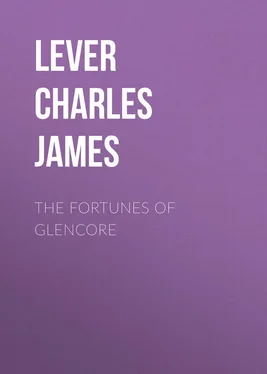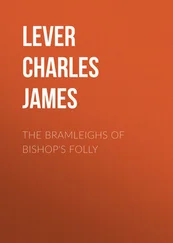Charles Lever - The Fortunes Of Glencore
Здесь есть возможность читать онлайн «Charles Lever - The Fortunes Of Glencore» — ознакомительный отрывок электронной книги совершенно бесплатно, а после прочтения отрывка купить полную версию. В некоторых случаях можно слушать аудио, скачать через торрент в формате fb2 и присутствует краткое содержание. Жанр: literature_19, foreign_antique, foreign_prose, на английском языке. Описание произведения, (предисловие) а так же отзывы посетителей доступны на портале библиотеки ЛибКат.
- Название:The Fortunes Of Glencore
- Автор:
- Жанр:
- Год:неизвестен
- ISBN:нет данных
- Рейтинг книги:4 / 5. Голосов: 1
-
Избранное:Добавить в избранное
- Отзывы:
-
Ваша оценка:
- 80
- 1
- 2
- 3
- 4
- 5
The Fortunes Of Glencore: краткое содержание, описание и аннотация
Предлагаем к чтению аннотацию, описание, краткое содержание или предисловие (зависит от того, что написал сам автор книги «The Fortunes Of Glencore»). Если вы не нашли необходимую информацию о книге — напишите в комментариях, мы постараемся отыскать её.
The Fortunes Of Glencore — читать онлайн ознакомительный отрывок
Ниже представлен текст книги, разбитый по страницам. Система сохранения места последней прочитанной страницы, позволяет с удобством читать онлайн бесплатно книгу «The Fortunes Of Glencore», без необходимости каждый раз заново искать на чём Вы остановились. Поставьте закладку, и сможете в любой момент перейти на страницу, на которой закончили чтение.
Интервал:
Закладка:
It was Sir Horace Upton’s fortune to have fallen into one of these embarrassments. He had advised the Home Government to take some measures, or at least look with favor on certain movements of the Poles in Russia, in order the better to obtain some concessions then required from the Cabinet of the Czar. The Premier did not approve of the suggestion, nor was it like to meet acceptance at home. We were in a pro-Russian fever at the moment. Some mob disturbances at Norwich, a Chartist meeting at Stockport, and something else in Wales, had frightened the nation into a hot stage of conservatism; and never was there such an ill-chosen moment to succor Poles or awaken dormant nationalities.
Upton’s proposal was rejected. He was even visited with one of those disagreeable acknowledgments by which the Foreign Office reminds a speculative minister that he is going ultra crepidam . When an envoy is snubbed, he always asks for leave of absence. If the castigation be severe, he invariably, on his return to England, goes to visit the Leader of the Opposition. This is the ritual. Sir Horace, however, only observed it in half. He came home; but after his first morning’s attendance at the Foreign Office, he disappeared; none saw or heard of him. He knew well all the value of mystery, and he accordingly disappeared from public view altogether.
When, therefore, Harcourt’s letter reached him, proposing that he should visit Glencore, the project came most opportunely; and that he only accepted it for a day, was in the spirit of his habitual diplomacy, since he then gave himself all the power of an immediate departure, or permitted the option of remaining gracefully, in defiance of all pre-engage-ments, and all plans to be elsewhere. We have been driven, for the sake of this small fact, to go a great way round in our history; but we promise our readers that Sir Horace was one of those people whose motives are never tracked without a considerable détour . The reader knows now why he was at Glencore, – he already knew how.
The terrible interview with Glencore brought back a second relapse of greater violence than the first, and it was nigh a fortnight ere he was pronounced out of danger. It was a strange life that Harcourt and Upton led in that dreary interval. Guests of one whose life was in utmost peril, they met in that old gallery each day to talk, in half-whispered sentences, over the sick man’s case, and his chances of recovery.
Harcourt frankly told Upton that the first relapse was the consequence of a scene between Glencore and himself. Upton made no similar confession. He reflected deeply, however, over all that had passed, and came to the conclusion that, in Glencore’s present condition, opposition might prejudice his chance of recovery, but never avail to turn him from his project. He also set himself to study the boy’s character, and found it, in all respects, the very type of his father’s. Great bashfulness, united to great boldness, timidity, and distrust, were there side by side with a rash, impetuous nature that would hesitate at nothing in pursuit of an object. Pride, however, was the great principle of his being, – the good and evil motive of all that was in him. He had pride on every subject. His name, his rank, his station, a consciousness of natural quickness, a sense of aptitude to learn whatever came before him, – all gave him the same feeling of pride.
“There’s a deal of good in that lad,” said Harcourt to Upton, one evening, as the boy had left the room; “I like his strong affection for his father, and that unbounded faith he seems to have in Glencore’s being better than every one else in the world.”
“It is an excellent religion, my dear Harcourt, if it could only last!” said the diplomat, smiling amiably.
“And why should n’t it last?” asked the other, impatiently.
“Just because nothing lasts that has its origin in ignorance. The boy has seen nothing of life, has had no opportunity for forming a judgment or instituting a comparison between any two objects. The first shot that breaches that same fortress of belief, down will come the whole edifice!”
“You ‘d give a lad to the Jesuits, then, to be trained up in every artifice and distrust?”
“Far from it, Harcourt. I think their system a mistake all through. The science of life must be self-learned, and it is a slow acquisition. All that education can do is to prepare the mind to receive it. Now, to employ the first years of a boy’s life by storing him with prejudices, is just to encumber a vessel with a rotten cargo that she must throw overboard before she can load with a profitable freight.”
“And is it in that category you’d class his love for his father?” asked the Colonel.
“Of course not; but any unnatural or exaggerated estimate of him is a great error, to lead to an equally unfair depreciation when the time of deception is past. To be plain, Harcourt, is that boy fitted to enter one of our great public schools, stand the hard, rough usage of his own equals, and buffet it as you or I have done?”
“Why not? or, at least, why should n’t he become so after a month or two?”
“Just because in that same month or two he’d either die broken-hearted, or plunge his knife into the heart of some comrade who insulted him.”
“Not a bit of it. You don’t know him at all. Charley is a fine give-and-take fellow; a little proud, perhaps, because he lives apart from all that are his equals. Let Glencore just take courage to send him to Harrow or Rugby, and my life on it, but he ‘ll be the manliest fellow in the school.”
“I ‘ll undertake, without Harrow or Rugby, that the boy should become something even greater than that,” said Upton, smiling.
“Oh, I know you sneer at my ideas of what a young fellow ought to be,” said Harcourt; “but, somehow, you did not neglect these same pursuits yourself. You can shoot as well as most men, and you ride better than any I know of.”
“One likes to do a little of everything, Harcourt,” said Upton, not at all displeased at this flattery; “and somehow it never suits a fellow, who really feels that he has fair abilities, to do anything badly; so that it comes to this: one does it well, or not at all. Now, you never heard me touch the piano?”
“Never.”
“Just because I’m only an inferior performer, and so I only play when perfectly alone.”
“Egad, if I could only master a waltz, or one of the melodies, I’d be at it whenever any one would listen to me.”
“You’re a good soul, and full of amiability, Harcourt,” said Upton; but the words sounded very much as though he said, “You’re a dear, good, sensible creature, without an atom of self-respect or esteem.”
Indeed, so conscious was Harcourt that the expression meant no compliment that he actually reddened and looked away. At last he took courage to renew the conversation, and said, —
“And what would you advise for the boy, then?”
“I ‘d scarcely lay down a system; but I ‘ll tell you what I would not do. I ‘d not bore him with mathematics; I ‘d not put his mind on the stretch in any direction; I ‘d not stifle the development of any taste that may be struggling within him, but rather encourage and foster it, since it is precisely by such an indication you ‘ll get some clew to his nature. Do you understand me?”
“I ‘m not quite sure I do; but I believe you’d leave him to something like utter idleness.”
“What to you , my dear Harcourt, would be utter idleness, I’ve no doubt; but not to him, perhaps.”
Again the Colonel looked mortified, but evidently knew not how to resent this new sneer.
“Well,” said he, after a pause, “the lad will not require to be a genius.”
“So much the better for him, probably; at all events, so much the better for his friends, and all who are to associate with him.”
Читать дальшеИнтервал:
Закладка:
Похожие книги на «The Fortunes Of Glencore»
Представляем Вашему вниманию похожие книги на «The Fortunes Of Glencore» списком для выбора. Мы отобрали схожую по названию и смыслу литературу в надежде предоставить читателям больше вариантов отыскать новые, интересные, ещё непрочитанные произведения.
Обсуждение, отзывы о книге «The Fortunes Of Glencore» и просто собственные мнения читателей. Оставьте ваши комментарии, напишите, что Вы думаете о произведении, его смысле или главных героях. Укажите что конкретно понравилось, а что нет, и почему Вы так считаете.












